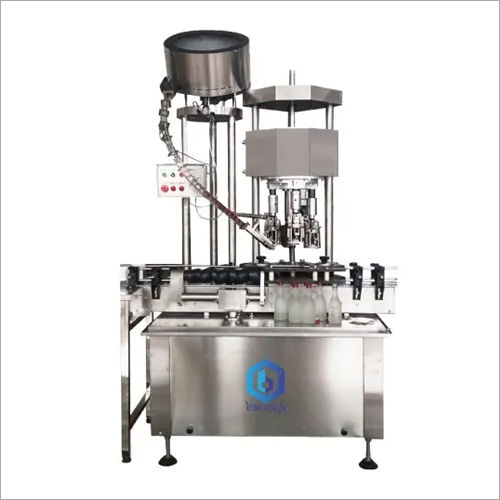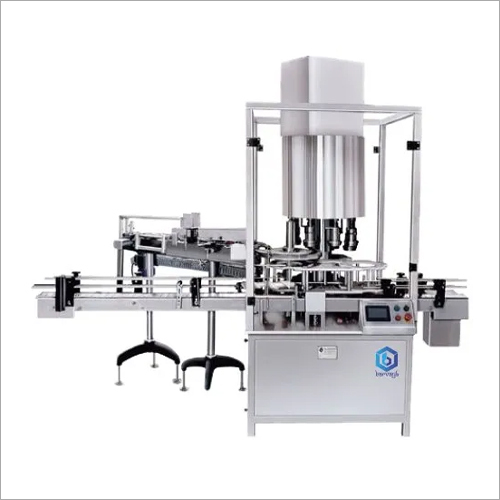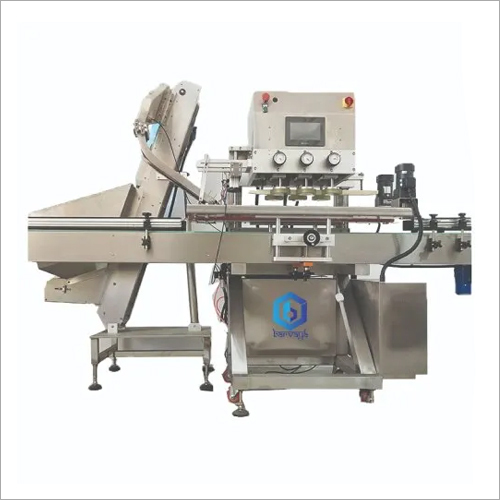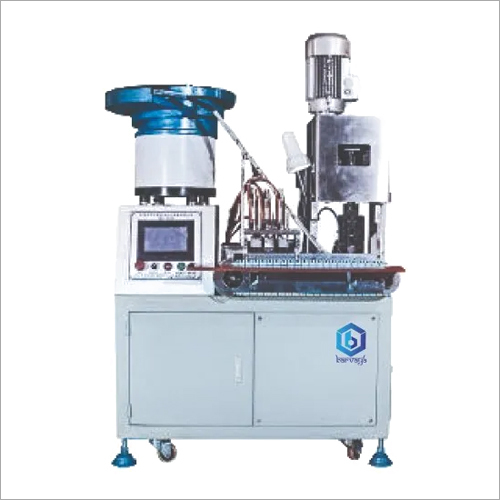Screw Capping Machine
400000 INR/Piece
Product Details:
- Material Mild Steel
- Automatic Grade Semi-Automatic
- Drive Type Electric
- Voltage 315 Volt (v)
- Click to View more
X
Screw Capping Machine Price And Quantity
- 400000 INR/Piece
- 1 Piece
Screw Capping Machine Product Specifications
- Semi-Automatic
- 315 Volt (v)
- Electric
- Mild Steel
Screw Capping Machine Trade Information
- Cash in Advance (CID)
- 10 Piece Per Month
- Week
- All India
Product Description
Made of stainless steel, BPI SC Screw Capping Machine is used for automatic capping or sealing of different shapes and sizes of containers and bottles. This capping system can easily integrate with caps of different diameters and shapes. Its application can be noticed in food and beverage packaging, chemical and cosmetics packing arena. This machine is well known for its adjustable operating speed to suit production requirement of different projects. This machine can automatically reject defective caps to maintain standard of capping and sealing.
Advantages of Screw Capping Machine:
1. Speed and Efficiency: Screw capping machines are capable of high-speed operations, applying caps to bottles and containers quickly and consistently. This helps streamline the packaging process and increase overall production efficiency.
2. Consistency: Automated screw cappers ensure a uniform and consistent application of caps, reducing the likelihood of human errors that can occur during manual cap application. This consistency is crucial for maintaining product integrity and preventing leakage.
3. Tightness and Security: Screw capping machines can apply caps with a controlled and precise amount of torque, ensuring that caps are securely tightened. This prevents issues like leaks, contamination, and tampering, thereby enhancing product safety and consumer satisfaction.
4. Reduced Labor Costs: By automating the capping process, manufacturers can significantly reduce the need for manual labor in cap application. This leads to cost savings in terms of labor expenses and potentially allows workers to be allocated to other tasks that require human attention.
5. Versatility: Screw capping machines can handle a wide range of container sizes and cap types. They can be easily adjusted to accommodate different bottle shapes and cap specifications, making them versatile for various packaging needs.
6. Minimized Product Loss: Manual cap application can sometimes result in product spillage and waste due to inconsistent tightening or handling errors. Screw capping machines help minimize product loss by ensuring that caps are applied correctly every time.
7. Reduced Physical Strain: Manual cap application can be physically demanding for workers, leading to fatigue and potential repetitive strain injuries. Automating the process with screw capping machines reduces the physical strain on workers and promotes a safer working environment.
8. Quality Control: Screw capping machines often incorporate sensors and monitoring systems to detect issues such as missing caps, improper cap placement, or tightening inconsistencies. This enhances quality control by identifying and addressing potential problems early in the packaging process.
9. Integration with Production Lines: Screw capping machines can be seamlessly integrated into existing production lines, allowing for efficient and continuous packaging operations. This integration helps maintain a smooth workflow and prevents bottlenecks in the packaging process.
10. Data Collection: Some advanced screw capping machines may include data collection and monitoring capabilities. This allows manufacturers to track production metrics, analyze performance trends, and make informed decisions to optimize their packaging processes.
Applications of Screw Capping Machine:
1. Beverage Industry: Screw capping machines are extensively used in the beverage industry to cap bottles of water, juices, soft drinks, energy drinks, alcoholic beverages, and more. They ensure proper sealing and prevent leakage, preserving the freshness and quality of the beverages.
2. Pharmaceutical Industry: In the pharmaceutical sector, screw capping machines are employed to cap medicine bottles and containers. These machines play a crucial role in maintaining the integrity of medications, preventing contamination, and complying with regulatory standards.
3. Food Industry: Screw capping machines are used to cap bottles and jars containing various food products such as sauces, condiments, dressings, oils, and more. They help extend the shelf life of these products by creating a secure seal.
4. Cosmetics and Personal Care Products: Screw capping machines are utilized in the packaging of cosmetics, lotions, creams, shampoos, and other personal care products. They ensure that these products are tightly sealed to prevent spoilage and maintain their quality.
5. Chemical Industry: Screw capping machines are employed in the packaging of chemicals, cleaning agents, detergents, and other industrial products. These machines help prevent spillage, contamination, and potential hazards associated with improper sealing.
6. Household and Cleaning Products: Products such as detergents, cleaning solutions, and disinfectants are often packaged in containers with screw caps. Screw capping machines provide consistent and secure sealing for these products.
7. Automotive and Lubricant Industry: Screw capping machines are used to cap bottles and containers of automotive fluids, lubricants, and oils. Proper sealing is essential to prevent leakage and maintain product quality.
8. Nutraceuticals and Dietary Supplements: Screw capping machines are employed in the packaging of vitamins, dietary supplements, and nutraceuticals. These machines ensure that the products are sealed to preserve their potency and effectiveness.
9. Household Chemicals: Cleaning products, pesticides, and other household chemicals require secure packaging to prevent accidental exposure and ensure user safety. Screw capping machines help achieve proper sealing in these applications.
10. Pet Care Products: Screw capping machines are used to package pet care products such as shampoos, conditioners, and other grooming items. These machines help maintain the integrity of the products and prevent leaks.
11. Industrial and Specialty Liquids: Industries dealing with specialty liquids, such as adhesives, solvents, and inks, use screw capping machines to ensure proper containment and minimize wastage.
12. Personal Care Items: Screw capping machines are used in the packaging of items like perfumes, essential oils, and other personal care products where a secure seal is essential for maintaining the product's aroma and quality.
FAQ:
1. What is a screw capping machine?
Ans: A screw capping machine is an automated device used to apply screw caps onto bottles, containers, and jars. It uses controlled torque to ensure consistent and secure cap placement.
2. How does a screw capping machine work?
Ans: Screw capping machines typically work by placing a cap on the container's opening and then using adjustable torque to screw the cap onto the container. This process ensures proper sealing and prevents leakage.
3. What types of containers can screw capping machines handle?
Ans: Screw capping machines are designed to handle a wide variety of containers, including bottles, jars, vials, and containers made of materials like glass, plastic, and metal.
4. Are screw capping machines adjustable for different cap sizes?
Ans: Yes, most screw capping machines are adjustable to accommodate different cap sizes and types. They usually have mechanisms for easy adjustment based on the specific packaging requirements.
5. Can screw capping machines work with different types of caps?
Ans: Yes, screw capping machines can work with different types of caps, including various cap shapes, materials, and closure mechanisms.
6. What is the advantage of using a screw capping machine over manual capping?
Ans: Screw capping machines offer advantages such as increased speed, consistent cap application, enhanced product security, reduced labor costs, and improved quality control compared to manual capping. They also reduce the risk of human errors.
7. Are screw capping machines suitable for high-speed production lines?
Ans: Yes, many screw capping machines are designed for high-speed production lines and can handle a large number of containers per minute, contributing to overall production efficiency.
8. Can screw capping machines prevent over-tightening of caps?
Ans: Yes, many screw capping machines have adjustable torque settings that can prevent over-tightening of caps. This helps maintain product integrity and prevents damage to containers and caps.
9. Are there different levels of automation for screw capping machines?
Ans: Yes, there are different levels of automation available for screw capping machines. Some machines are semi-automatic, requiring some manual intervention, while others are fully automatic and can operate without human assistance.
10. Can screw capping machines detect missing caps or misaligned containers?
Ans: Yes, advanced screw capping machines may include sensors and vision systems that can detect missing caps, misaligned containers, and other issues during the capping process.
11. What maintenance is required for screw capping machines?
Ans: Routine maintenance includes cleaning, lubrication, and occasional calibration of torque settings. Regular inspections and servicing are also necessary to ensure optimal performance and longevity.
12. Are screw capping machines suitable for small-scale businesses?
Ans: Yes, screw capping machines come in various sizes and capacities, making them suitable for both small-scale and large-scale businesses, depending on their production needs.
13. Can screw capping machines be integrated into existing production lines?
Ans: Yes, screw capping machines are designed to be easily integrated into existing production lines, allowing for a seamless packaging process.
14. Do screw capping machines require specialized training to operate?
Ans: While basic operation may not require extensive training, proper training is recommended to ensure operators understand the machine's features, settings, and safety protocols.
15. What safety features do screw capping machines have?
Ans: Screw capping machines may include safety features such as emergency stop buttons, safety guards, and sensors to prevent injury and ensure operator safety.
Enter Buying Requirement Details

 English
English Spanish
Spanish French
French German
German Italian
Italian Chinese (Simplified)
Chinese (Simplified) Japanese
Japanese Korean
Korean Arabic
Arabic Portuguese
Portuguese




